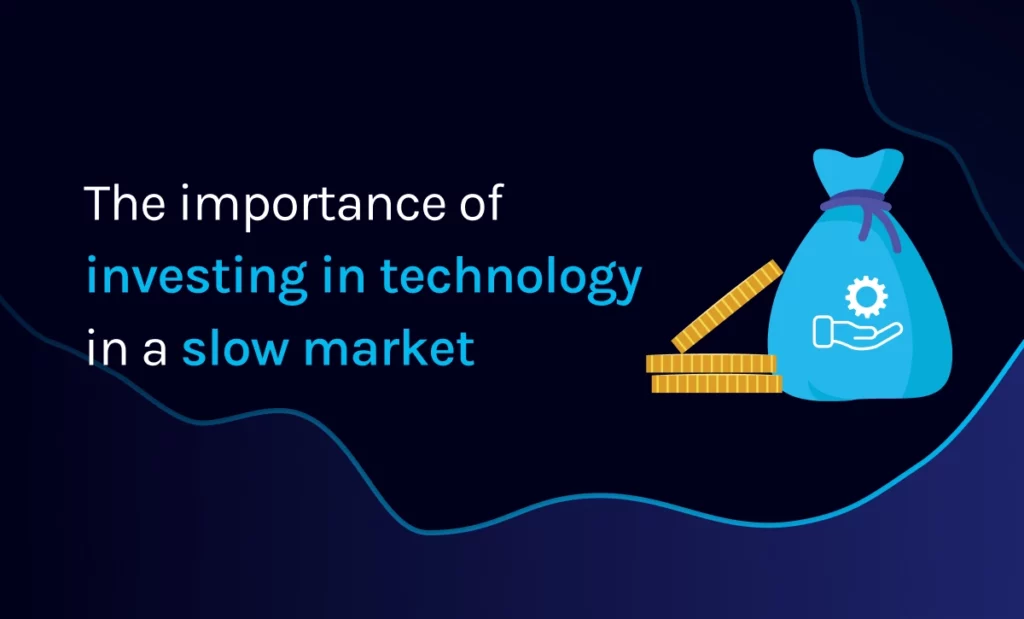This website uses cookies so that we can provide you with the best user experience possible. Cookie information is stored in your browser and performs functions such as recognising you when you return to our website and helping our team to understand which sections of the website you find most interesting and useful.
The importance of investing in technology in a slow market

The macroeconomic environment in the United States is leading to questions about the housing market in 2023, with a combination of high interest rates and comparatively low inventory deterring some potential homebuyers. Since a low point of 2.1% in July 2021, interest rates for a 30-year fixed-rate mortgage have increased by more than four percentage points, reaching approximately 6.8% earlier this month.
While the market has remained relatively stable in 2023, these factors have led to uncertainty for both homebuyers and mortgage lenders. However, we all know that the housing market, and the economy as a whole, is cyclical. To remain competitive and flexible, mortgage lenders need to continue building and improving their technology, processes and operations in a down market for long-term success.
Scalability for fluctuating markets
Historically, lenders, whether in mortgage, small business or consumer, have fluctuated staffing, technology and overall investment with market shifts. Today, many mortgage lenders are rethinking the traditional practice of maintaining a large staff to process loan applications, turning to automation to better equip themselves to handle fluctuations in the industry.
Advances in financial technology and automation are a main driver in this, allowing lenders to capitalize on downtime and streamline processes during a down market and enabling them to emerge stronger, more flexible and ready to scale as the market shifts.
Using this time to modernize their technology stack with artificial intelligence (AI) and automation tools will help prepare lenders for the future, embedding efficiency and scalability within their processes to reduce the need to hire, lay off or otherwise flex their workforce with the market.
Investing in technology and automation
Fintech solutions exist to solve problems and to help financial services organizations meet customer demands. Even in tighter market conditions, the shift to a more digital banking industry is well underway and customer expectations for continued digitization will not wane during a downturn. Lenders need to remain on the offensive in terms of technology and automation to remain competitive in the long run.
In addition to customer expectations, taking this time to develop a modern financial technology stack can support and improve mortgage lenders’ internal processes. AI-driven automation not only leads to efficiency and scalability, but can support more informed decision-making and reduce the need for time-intensive tasks, freeing up valuable employee time for more strategic work and customer relationship building.
Whitepaper | 5 steps to bring your lending analytics into the future
Download our 5-step guide to bring your lending analytics into the future with a modern technology stack that supports more informed, accurate lending decisions.
Download WhitepaperThe role of document automation
For lenders in particular, AI-driven document automation plays an important role in reducing errors, saving time and ultimately, improving lending decisions.
Regardless of market conditions, AI-driven document automation has a significant role to play in improving the lending decision-making process. Automating previously time-intensive and error-prone processes, such as classifying financial documents, capturing key data fields, detecting fraud and analyzing income documents enables mortgage lenders to make faster, data-driven lending decisions.
Modernizing the mortgage lending process
AI, automation and digitization are transforming processes and experiences across industries and mortgage lending is no exception. With a modern technology stack, mortgage lenders can not only automate time consuming tasks like manual data entry to free up employees’ time for more valuable work, but can reduce the risk of fraudulent documents, enable powerful analytics and embed compliance analysis directly into workflows.
The decision-making and risk management benefits of AI-driven document automation enable mortgage lenders to maintain a competitive edge in any market condition.
See the savings for yourself with Ocrolus’ free mortgage ROI calculator
Forward-thinking lenders won’t let a down market deter them from investing in technology and automation. To stay competitive, lenders must capitalize on downtime and streamline processes for long-term success.
Book a demo to learn how Ocrolus can help you take steps now to secure the future.
Key takeaways
- In a slow market, mortgage lenders need to invest in technology for long-term scalability.
- Capitalizing on downtime to streamline processes can make lenders stronger and more scalable to respond to market corrections.
- Document automation and analysis can help lenders make more informed, quality decisions in all market conditions.





